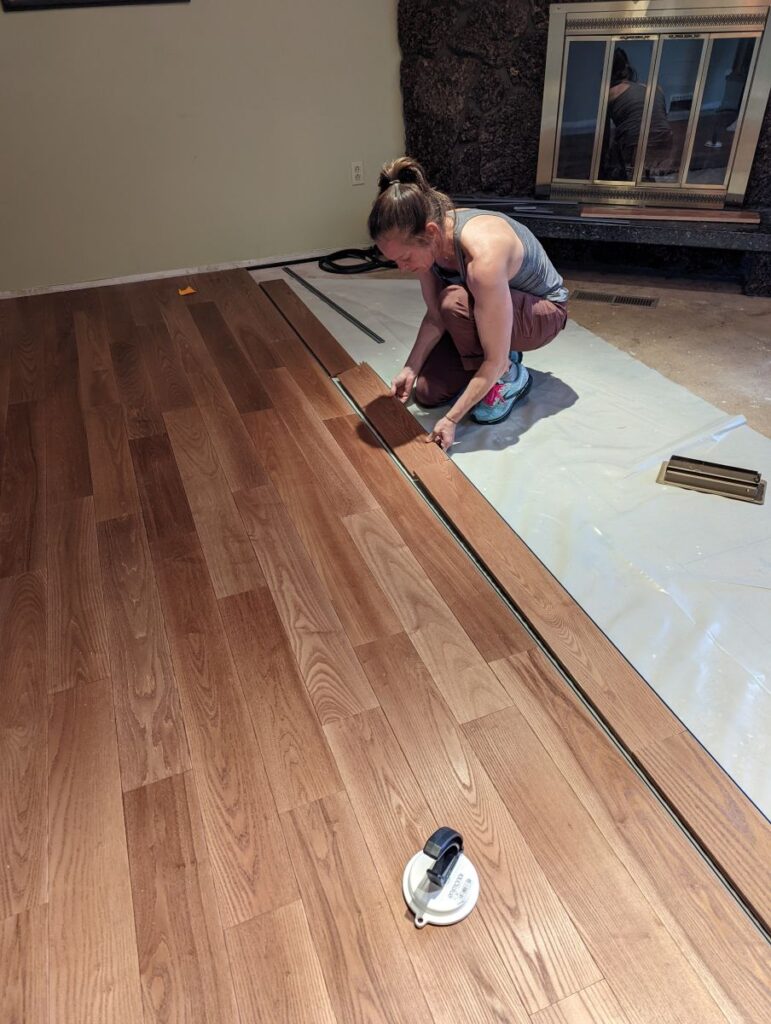By Cara Aungst

Photo credit: Steller Floors
What happens when an idea turns into an actual product and that product goes super-viral on YouTube? And then — in the middle of COVID — that product defies all odds and hits $1M in sales after only 24 months in existence?
It depends. In many instances, this kind of startup, flush with success, is perfectly positioned for a venture capitalist or an angel investor to help grow the company and get it ready to sell. It’s another story altogether when that company is fully vested in its vision and in its community and has no intention of going anywhere but up. This is the story of Steller Floors in Tyrone.
I was invited to a press day at Steller at the end of March. In case you missed it (which I did, I’ll get to that in a minute), it was attended by both local economic development drivers like the Ben Franklin Technology Partners team and state leaders like Senator Judy Ward, Representative Jim Gregory and DCED Deputy Directors Steven D’ettorre and Richard Vilello. When a freakish rainstorm forced me to cancel, Steller co-founder Britta Teller graciously offered to host HappyValley Industry a few weeks later.
“We asked ourselves, ‘How do you make a difference? How do you make sure the place you live is good?’ You have to invest in it. You pour blood, sweat and tears into it. It’s work. And we’re watching that work pay off.”
As it turned out, I’d missed out on the earlier torrential downpour, but got a front row seat to a meteoric event of another kind. Our interview couldn’t start until Teller got off an unscheduled phone call with architects who were calling her from one of the most famous buildings in New York City. They peppered her with questions about Steller Floors’ patented floating floor system along with its sustainability and durability, and Teller delivered. “I need a minute,” she said with a laugh as she hung up the phone.
The possible sale to provide flooring in that building would be momentous, but that’s something that Steller Floors is pretty good at doing.
The backwards business plan: A video, a wedding and a patent
The company started when husband-and-wife team Evan Stover and Britta Teller met as biology students in college. Stover’s father had spent his career in wood products and Stover joined him in the industry when they started a consulting company. They spent a lot of time looking at malfunctioning hardwood floors in people’s homes and realized the need for a product that worked with wood’s natural properties, not against it. Teller was working on her PhD in plant science and soon caught the wood products bug as they invented their Steller product: wood flooring that clicks together to form a floating floor, requiring no special installation and, best of all, can be uninstalled and removed to be used again and again. They applied for a patent on the same weekend that they got married and launched Steller Floors in 2018.
This video made Steller Floors go viral
From there, Teller said that they did everything backwards. “We booked a trade show, threw together a brand name that combined our last names (Teller plus Stover), got caught on a YouTube channel and went viral. Yes, we launched, but it was all homegrown.”
Ben Franklin Technology Partners jumped in to help, renovating the business’s website, developing a logo and launching the brand. “They helped us invest in doing it right,” Teller said. In fact, Ben Franklin’s expertise ultimately led to Steller hiring Ben Franklin Entrepreneur-in-Residence Scott Johnson to become the Steller CEO in July 2021.
“We aren’t building all of this for an exit”
This past year has been what Teller calls “Steller 2.0.” Hires went from four to 15. The team maxed out every available inch of its meticulously-outfitted manufacturing facility, even installing an admin trailer minutes before press day started, and selling over $1M in flooring made from Pennsylvania hardwood all harvested with a 150-mile footprint of the Tyrone-based company.
This growth brings opportunities along with challenges. For one, the team is firmly planted in Tyrone. “My husband’s family has lived here since the Revolutionary War,” Teller said. “My son is going to inherit the family house one day. We aren’t building all of this for an exit. We want to stay here and build up this community.”
“We are looking for the exact right kind of investor who can partner with us to grow here without the intent to sell or move away from Happy Valley. We want to lay the path that other mid-stage young companies can follow. We aren’t the only company on this journey.”
Investing in the community means paying a living wage and fostering growth in a rural area. Teller said, “We asked ourselves, ‘How do you make a difference? How do you make sure the place you live is good?’ You have to invest in it. You pour blood, sweat and tears into it. It’s work. And we’re watching that work pay off.”
The challenge? “We need to grow,” she said. “We need facilities, more marketing and staff. We are looking for the exact right kind of investor who can partner with us to grow here without the intent to sell or move away from Happy Valley. We want to lay the path that other mid-stage young companies can follow. We aren’t the only company on this journey.”
As Stover and Teller look for financial partners who can help them leap into Steller 3.0, they’ll keep doing what’s worked so far — creating high-value, high-craft flooring sustainably, with transparency, and a heaping cup of central Pennsylvania grit. Stay tuned.
Cara Aungst writes about industry, innovation and how Happy Valley ideas change the world. She can be reached with story ideas and comments at Cara@AffinityConnection.com.

